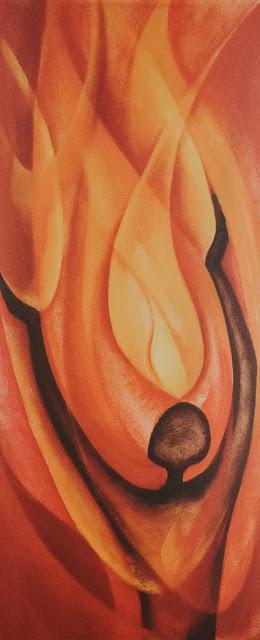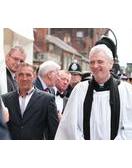Acts 2.1-4
 I was very struck, when I pointed to that banner and asked someone what is was about, that the answer they gave me was, 'hell'.
I was very struck, when I pointed to that banner and asked someone what is was about, that the answer they gave me was, 'hell'.Fire can represent hell and judgment and destruction. Sodom and Gomorrah are two cities in the Old Testament, where people had rejected God and there was serial violence and abuse, and they are destroyed by fire (Genesis 3:24)Jesus speaks of the ‘eternal fire’ of hell (Matthew 18:8); Revelation speaks of the second death being a lake of fire, into which even death and hades are thrown (Revelation 20:14) And so we may be familiar with those images of hell: of Dante’s inferno (although interestingly, the deepest pit of hell is not full of fire, but full of ice), Hieronymus Bosch’s nightmares, and the icons of the last judgment.
But fire is also about the presence of GodGod appears to Moses in a burning bush (Exodus 3:2)God leads the people of Israel, at night, by a pillar of fire (Exodus 13:21)Malachi speaks of the coming Messiah and tells us that he will be like a refiner’s fire (Malachi 3:2) – a fire that purifies. If you have gold and silver but they are polluted with other elements, you put it in the refiners fire and it is purified.
And John the Baptist tells us that Jesus, when he comes, will baptise us with Holy Spirit and with fire (Luke 3:16).
So it is not surprising that when Holy Spirit comes on the first Christians, it is as tongues of fireHe comes as the presence of GodHe comes as the purifying, refining fire of God
He comes to us as we are and, if we permit him, he will purify us.
And we read in Acts that Holy Spirit comes in tonguesof flame. That is significant, because the Greek word that is translated as ‘languages’ in verse 4 in our bibles is – in fact – the same word that is used for ‘tongues’ in verse 3. So the tongues of fire, that come from heaven, transform the disciples’ tongues so that they speak in the different tonguesof the peoples. This is slightly different from the gift of tongues which we read about in Corinthians, because here the disciples speak in known languages, which previously they did not speak. This is the foreigners dream! But what is important here is not how they are speaking, or in what language they are speaking – although I note that God speaks to people in the language that they understand - but the fact that they are declaring the praises of God.
There is a battle for your tongue. James, who was Jesus’ brother, wrote a letter to some of the early Christians. We know what was in that letter. James writes that in each of us there is the fire of hell, a fire of destruction and death. That fire of hell sets our tongue on fire, and makes it a spark that brings destruction, like a spark that starts a forest fire. (James 3:5-6). One bitter or envious or cruel or arrogant word can cause so much damage. It destroys other people and it ultimately destroys you.
But we do not need to despair. Because of Jesus’ death, resurrection and ascension, there is another fire: the fire of Holy Spirit. This fire comes from the outside onto us and then into us. It comes on all who long for Holy Spirit and all who ask God for Holy Spirit. This fire is far more powerful than all the forces of destruction and death that are in us, and it overwhelms them. In place of death it gives lifeIn place of hatred it gives loveIn place of resentment or envy it gives generosityIn place of criticism it releases praiseIn place of fear it gives hope
That is why, when Holy Spirit comes, the first Christians declare the praises of God. They praise God for what he has done: for coming to live among us in his Son, for his death and resurrection and ascension. And when Holy Spirit comes on us, we are set free to praise God for what he has given us: this creation, life, each other, his word and promises, forgiveness, acceptance, answers to prayers – seen and unseen, peace and joy, kindness of others, his presence with and in us, hope that we will be with him. And we praise God for his qualities: his love, holiness, mercy, generosity, wisdom, faithfulness, power and eternity.
Human fire is OK but only if it is kept at a distance. I guess if you have ever experienced fire that is out of control – we saw those dreadful scenes from Sheremetova – then you will be very frightened of fire. This image may be quite difficult to takeBut fire is OK if kept at a distance. The sun is good for us, but only because it is at the right distance from the earth. If it was further away, we would freeze. If it was closer to us, we would fry. You don’t want to get too far from the fire, but you don’t want to get to close to the fire
But the divine fire, the fire of Holy Spirit, is different. We are invited to welcome this fire, to long for this fire, to ask for this fire, and to come closer to this fire. We come fearful, aware of our sinfulness and holiness, aware of our utter nothingness before God, but we come with Jesus, knowing that we are forgiven and accepted and protected and welcomed. And as we come closer to this fire, as we allow this fire onto us and into us, so Holy Spirit fire sets us on fire. We begin to burn with this fire. It overwhelms the fire of hell, the fire of fear, the fire of destruction and death that has been in our heart. It begins to burn up all that is rubbish in us, all that is death in us, so that we begin to burn with the radiance and purity and holiness of God. It releases our tongue so that we begin to praise God. We become this fire.
There is a story from the desert fathers. Abba Lot went to see Abba Joseph and said to him: ‘Abba, as far as I can I say my little office, I fast a little, I pray and meditate, I live in peace and again as far as I can, I purify my thoughts. What else can I do?’ Then, the old man stood up and stretched his hands toward heaven. His fingers became like ten lamps of fire, and he said to him: ‘If you really want, you can become all flame.’

